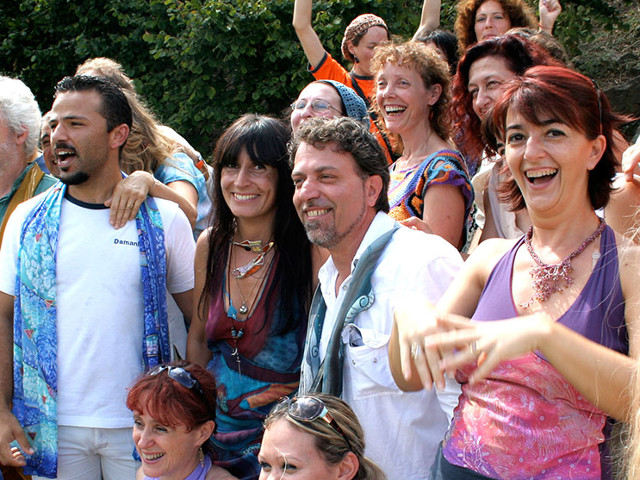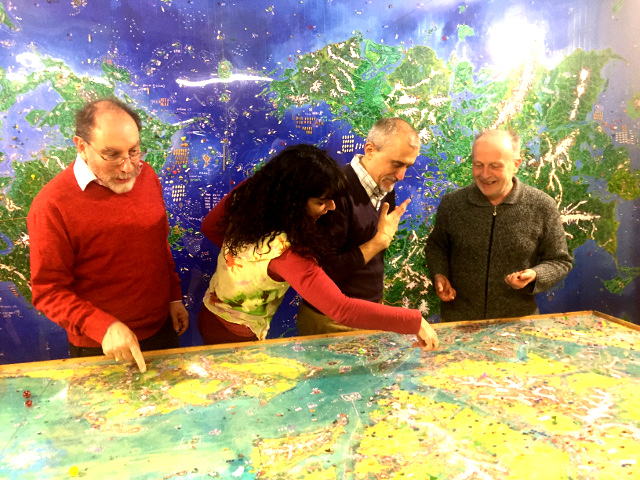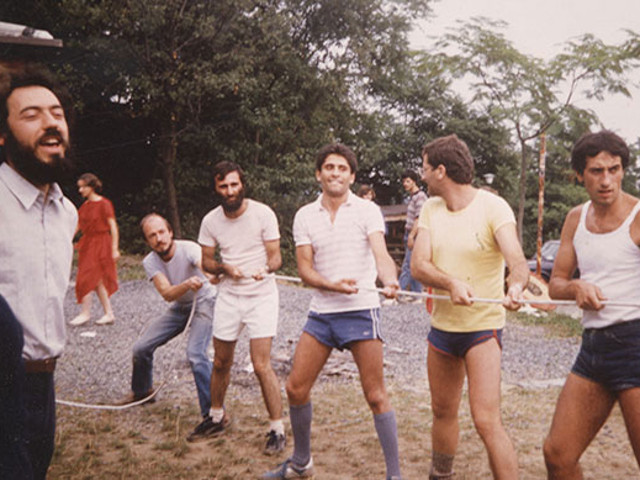When Damanhur was well organized in 1983 and everything seemed to be going smoothly, Falco Tarassaco decided to make a radical change in the life of the community. Why?
Because if you have the courage to change when everything is going well you also have enough energy to transform things for the better, and you can experience change not as a remedy, but as a strategy to grow.
Falco called this new phase the “Game of Life” and started traveling all over Italy with many people. Playing together in a magical and creative atmosphere, we dreamed of a Damanhur full of art and great works and we laid the foundations for the new development of the whole community.

When the trip physically returned to Damanhur, to be able to infect with the same enthusiasm those who had not participated in this movement and felt distant from the new proposals, Falco proposed a “battle” in which, always playing, they would determine who would guide the transformation of Damanhur: the newcomers through the Game of Life or the old generation who had founded Damanhur!
That battle was epic! It mixed the energies and emotions in everyone, dissolved prejudices and fears that were generated in both factions and in only a few days, was able to produce a level of union and sharing that would last a lifetime and otherwise be achieved in months, if not in years.
Playing together makes “quantum leaps” in any context the game can represent, at the same time, the fuel of change and the solvent of difficult situations accelerates the processes and reassembles them according to a new balance because when you play you are more open and permeable to accept new logic.
Since then the “battles” have become a tradition in Damanhur. Divided by teams, the Damanhurians camped in winter for days and nights with temperatures below zero! They were in the woods with the aim of stealing the flags of the others. In a climate of survival and fun in general, there have been attacks, strategic retreats and even changes of camp that have involved hundreds of people, often at the same time.
Plato said: “It is easier to know a person in 1 hour of play than in 1 year of conversation”. He was right! The ‘Battle of the Arts’ was another example of how, playing together, it was possible to build works of art that to this day, still make Damjl beautiful: the altar of the Earth, the stone stairway leading to the Open Temple, the painted walls and more. At that time the teams were called by the names of animals. There were the Pink Bass, Lemurs, Armadillos, Leopards, Lizards and Barracuda. Even today, after almost thirty years, if we talk about the Battle of Art, Damanhurians get fired up, ready to argue that their team was better than the others!
The Horusiadi that take place every year, in the summer, are games in which the teams are formed by the different Community regions, or a group of 4-5 or 6 communities that form a single team. The races are many and again the competition -constructive! It explodes and involves everyone in the challenges and of course the cheering. Yes, even in Damanhur there is fan support and even the calmest and most seraphic people go wild during these tense times!

Finally, the most incredible of the games is ‘Damanhurian Risk‘. It is incredible because it is difficult to believe that thirty people over 25 years have developed this board game to fill up an entire wall on which an imaginary planisphere is drawn and one follows long cycles like eras. Here civilizations are born, evolve, disappear and transform themselves, giving life to new forms of civilization, each strongly characterized and, above all, perpetually at war to affirm its own supremacy or its right to exist.

Anyone approaching this game takes a month before they can begin to understand what these strange people are talking about! Two nights a week, they are involved in declarations of war, coup, cases of international espionage, technological developments and more. It truly is a game of risk!
So… does the ‘Game’ really exist in Damanhur? Obviously yes, but if you ask the Damanhurians, they will answer not enough, because it is true that you can never really play enough!
The Game is the most serious thing to do to build a project together!









This sounds like a wonderful event for any group needing to revive itself and find meaning in getting together for support. I like it…
Yes Simone, the aim of this kind of dynamics (among other things) is to establish an incredible sense of connection between the people in the group.
I love the idea of your “Game of LIfe” and want to share this about finite and infinite games. I hope someday to experience the Damanhur ‘game.’
FINITE AND INFINITE GAMES:WHAT GAME ARE YOU PLAYING?
Arthur W. Rashap
Each and all of us are players in many ‘games.’ From our earliest days we are groomed to be players and team members and indoctrinated with the idea that “Winning isn’t everything, it’s the only thing.” This assertion about the importance of winning has been touted as a basic tenet of the American sports creed and, at the same time, identified as encapsulating what is purportedly wrong with competition. This credo has served as counterpoint to the well known sentiment by sports journalist Grantland Rice that, “it’s not that you won or lost but how you played the game,” and to the modern Olympic creed expressed by its founder Pierre de Coubertin: “The most important thing. . . is not winning but taking part.”
Look at the political scene today, what the media and social media constantly focus on, and the divisions that have arisen in our nation as well as in the rest of the planet. Let’s look at the pollsters, their polls, and the way “we the people” are diced, sliced, divided, lumped, bumped, and piled by those who make and share these polls and then have constant discussions thereof. From an analysis from way above, it looks like there are two categories of ‘games’ being played.
James P. Carse was the Director of Religious Studies at New York University for thirty years. He was involved with a diverse group exploring gaming at NYU. Out of that came the concept of ‘finite’ and ‘infinite’ games that was put forth in his book Finite and Infinite Games. (1996, New York, Ballantine Books).
Carse demonstrates a way of looking at actions in life as being a part of two types of what he describes as “games:” finite and infinite. Both games are played within rules, as agreed upon by the participants; however, the meaning of the rules is different for the two types of games. In the finite game, the player becomes part of a group of players who are then defined, segregated, and put into a labeled silo. In the infinite game, in contrast, we share a commonality.
In short, a finite game is played with the purpose of winning (thus ending the game), while an infinite game is played with the purpose of continuing the play. A finite game is resolved within the context of its rules, with a winner of the contest being declared and receiving a victory. The rules exist to ensure the game is finite. Examples are elections, debates, sports, receiving a degree from an educational institution, belonging to a society, or engaging in war. Participating in a finite game requires conscious thought, and assigns the participants to one or more designations or assignments into predetermined silos. Ethnicity; age; sex; race; income; education; nationality; party; and a myriad of subcategories of these and the never-ending additions to the list.
In game theory, continued participation in a round of the finite game is said to be involuntary. You are sentenced to a named silo and there you shall linger. Even exiting the game early must be provided for by the rules.
Infinite games, on the other hand, do not have a knowable beginning or ending. They are played with the goal of continuing play and sometimes with a purpose of bringing more players into the game. An infinite game continues play, for the sake of play. If the game is approaching resolution because of the rules of play, the rules must be changed to allow continued play. The rules exist to ensure the game is infinite. The best example is life. Life is the ultimate infinite game. Every person is energized by the infinite spirit which is actualized in the material world. This is where the moral imperative, mutuality, comes in. How do we get to common ground that gets us ahead. There is the infinite, the finite, and then the most powerful of all, the infinity within.
As this rather unique idea developed there were unexpected features of playing this game that came into its development. If the purpose of a finite game is to conclude play as a winner, then play itself acquires distinctly negative quality. If your opponents seek only to make you a loser, the play actually stands in the way of the desired result. To win is to eliminate the play at once. Finite players find themselves in a strange situation: they are playing against play itself. “Winning” implies a loser. We the People have been divided. And as the games proliferate into more and more winners and losers, the infinite game disintegrates.
The way the game is played can get very complicated. A recent entry from Professor Carse on his website asks: “Did President Putin bomb Syrian civilians out a long friendship with Assad, or was it a move to be the Master Player over his corner of the world? What was the longer game in the American invasion of Iraq and Afghanistan? What, for instance, is meant by the term, ‘American exceptionalism’?”
Taking this context and its challenges, let’s look directly at the nature of an infinite game. If the purpose of such human engagement with the world is to continue the play, it would mean there are no winners–and no losers. The essential strategy would be to keep everyone in play. Finite players play within strict rules, else they cannot say who has won or who has lost. Infinite players play with different “rules” because the way the infinite game is played must be constantly adjusted in response to changing circumstances – keeping in view the context and the values.
The first chapter of Carse’s book consisted of three sentences. There are at least two kinds of games. One could be called finite, the other infinite. A finite game is played for the purpose of winning, an infinite game for the purpose of continuing the play.
Here is the final chapter in its entirety:
There is but one infinite game.
Arthur W. Rashap, J.D., LL.M. has had a very diverse career from Wall Street lawyer and investment banker, to Arts Administrator, to political lawyer for the Rockefeller Family, to ginseng farmer, to advocate for the elderly. See his website: http://www.theeternalsea.com
Thank you Arthur for this interesting article. It is a challenge to create games that makes us grow and where we have fun at the same time but it is possible. You are welcome to visit Damanhur
any time! ????✨????????